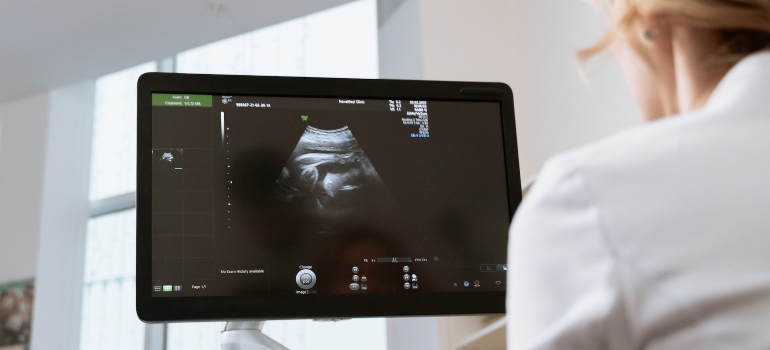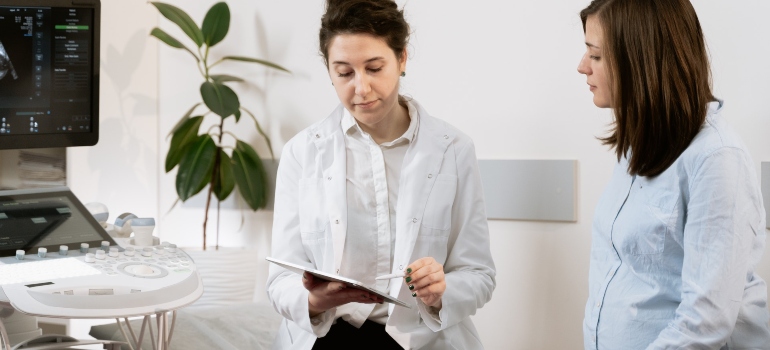Rehab For Pregnant Women
If you or someone you know is in need of specialized care for pregnant women battling addiction, feel free to reach out to us for more details. Our compassionate team is ready to provide support and guidance.
Drug abuse during pregnancy is detrimental in various ways for both mother and the baby. If you happen to be in this situation, rest assured there is a way out. At Harmony Ridge Recovery Center, we provide drug rehab for pregnant women, as well as required psychotherapy.

We operate as a meth rehab center that West Virginia residents highly recommend. Due to years of intensive work and growth, we optimized our services with an aim to make addiction recovery wholesome.
Drug Abuse During Pregnancy
A 2012 study revealed that six percent of pregnant women in the U.S. use illicit drugs. Rehab for pregnant women is widely available. However, the stigma associated with drug and alcohol abuse during pregnancy is a common barrier to treatment.
If you’re pregnant and have an addiction, you might be wondering how it will affect your unborn child. Any substance you consume while pregnant can pass through the placenta and be shared with your baby. Babies in the womb can also develop addictions with continued exposure to opioids. Drugs and alcohol increase the potential for complications in pregnant women. According to the National Institute on Drug Abuse, women with an addiction and a concurrent mental health disorder are at the greatest risk of having pregnancy complications.
Miscarriage
When a prenatal child dies prior to the 24th week of pregnancy, it’s considered a miscarriage. Up to 15 percent of all pregnancies terminate in miscarriage. These events can result from genetics, infections, diseases, eating disorders, and alcohol or drug abuse.
Stillbirth
When a baby is born after the 24th week of pregnancy with no sign of life, it’s considered a stillbirth. These events are usually attributed to placental abnormalities. Nevertheless, alcohol and drugs can be contributing factors.
Placenta Abruption
When a placenta detaches from the uterine wall before labor, it’s thought to be caused by alcohol, drugs, or tobacco. This complication can result in developmental disabilities for the newborn.
Premature Birth
Babies born between the 34th and the 37th week of pregnancy are considered premature. Most early deliveries result from conditions like heart disease, kidney disease, diabetes, and substance abuse. Premature babies may have breathing problems, underdeveloped organs, and the inability to maintain a consistent body temperature. They can require intensive care for weeks or even months.
Fetal Alcohol Syndrome (FAS)
FAS is caused by drinking alcohol while pregnant. The alcohol is delivered to the baby via the umbilical cord. Fetal alcohol syndrome can occur at any time during your pregnancy. Even one glass of wine poses a risk. Here are some common symptoms of FAS:
- CNS problems
- Growth problems
- Issues with memory and attention
- Learning disabilities
- Hearing, vision, and communication issues
- Difficulties in school and in social relationships
Neonatal Abstinence Syndrome (NAS)
Infants born with NAS have been regularly exposed to drugs like heroin, oxycodone, hydrocodone, codeine, and morphine during pregnancy. As these drugs pass through the placenta, the baby develops a dependency.
After birth, the infant will experience opioid withdrawal symptoms unless it continues to receive the drug. If the child is deprived of opioids, they may experience these and other symptoms:
- Rapid breathing
- Diarrhea
- Blotchy skin
- Fever
- Premature birth
- Vomiting
- Sweating
- Low body weight
- Small body size
- Seizures
- Trembling
Other addictive substances, including amphetamines, cocaine, and tobacco, can all cause long-term health problems for unborn babies. However, there’s no evidence that drugs other than opioids cause neonatal addiction. Babies born with NAS have a higher risk of Sudden Infant Death Syndrome (SIDS). Nevertheless, pregnant women should not abruptly stop taking opioids. Severe withdrawal symptoms can develop and lead to premature birth for your baby.
Rather, a supervised and gradual withdrawal is the established protocol for drug detoxing while pregnant. The sooner you enter rehab for pregnant women, the better the odds for you and your child. Unfortunately, even if women are drug detoxing while pregnant, the baby can still be born with an opioid dependency. The baby will require close supervision while being gradually detoxed.
Contact Harmony Ridge Today!
The first step toward achieving recovery is to reach out to one of the rehabs in WV that can get you on the track to recovery. Our admissions team is available 24 hours a day, 7 days a week, 365 days a year. Give us a call today!
Contact Us TodayBirth Defects
Ingesting drugs and alcohol while pregnant can cause a variety of birth defects for the baby, and all of them can be serious. This is especially true if the mother has ingested a large amount of drugs and alcohol for an extended period of time during her pregnancy. That’s why rehab for pregnant women with substance use issues should occur as quickly as possible. Below are some of the birth defects that babies of pregnant mothers who abuse substances may experience.

Sudden Infant Death Syndrome (SIDS)
When a healthy baby in its first year of life dies for no apparent reason while asleep, usually in its crib, it’s called sudden infant death syndrome. SIDS is not confined to babies of moms who have substance abuse disorders.
Nevertheless, SIDS is more common among babies who have been exposed to drugs and alcohol during pregnancy than it is in the general population. SIDS is thought to be caused by irregularities in brain areas that manage breathing and arousal from sleep.
Improper brain development in the womb could be responsible for SIDS. Researchers aren’t really sure what causes SIDS. However, it seems to be associated with low birth weight and premature birth.
Microcephaly
Microcephaly, also known as small head circumference, indicates that a baby’s brain has not developed as it should. As the brain expands and grows in utero, the skull also grows to accommodate the developing brain. Microcephaly at birth indicates that because the brain did not develop fully, the size of the skull is smaller than it should be.
Low Birth Weight
Roughly eight percent of infants exposed to drugs and alcohol during pregnancy have a low birth weight. Less than five pounds and eight ounces at birth is considered underweight for a newborn.
Although many underweight babies are nevertheless healthy, others develop breathing, intestinal, heart, and vision problems in addition to bleeding of the brain. Low birth weight can cause future health problems for babies, too. These conditions include high blood pressure, obesity, heart disease, diabetes, and sudden infant death syndrome during the first year of life.
Behavioral and Developmental Disabilities
Drugs and alcohol ingested while pregnant can damage a baby’s central nervous system. The infant may develop behavioral problems and perform poorly in school later on in life as a result. This is just another reason why rehab for pregnant women with substance use issues should occur as soon into the mother’s pregnancy as possible.
Co-Occurring Disorders
A majority of those with substance use disorders also have concurrent mental health disorders. Because concurrent issues often go untreated, they can fuel addiction and make everything worse.
A 2006 study published in the Journal of Substance Abuse Treatment estimated that several co-occurring disorders had a high prevalence among those with substance use disorders:
- Mood disorders like depression: 40 to 43 percent
- Anxiety disorders like panic attacks: 24 to 27 percent
- Post-traumatic stress disorder: 24 to 27 percent
- Severe mental illness: 16 to 21 percent
- Antisocial personality disorder: 18 to 20 percent
- Borderline personality disorder: 17 to 18 percent
Rehab for a pregnant mother involves an assessment to determine the presence and severity of co-occurring mental health disorders. Those conditions are then treated simultaneously with the addiction.

Studies cited in the British Columbia Medical Journal have found that women are more likely to develop mental health issues while pregnant. A limited amount of research suggests that pregnant women are more likely to develop a substance use disorder if they have one or more of these co-occurring mental health disorders:
Postpartum Depression
Up to 17% of women report feeling depressed during pregnancy. A study found that babies of depressed moms were prone to early developmental problems.
Postpartum depression usually starts during pregnancy and continues for some time after delivery. It’s characterized by feelings of extreme sadness, changes in appetite, indifference, anxiety, low energy, irritability, fatigue, and poor sleep.
Many women keep these feelings to themselves because they feel guilty. After all, you’re supposed to feel happy about a new baby, right? Unfortunately, this reluctance keeps pregnant women from getting the support they need to deal with depression in a healthier way.
Panic Disorders
One study found that extreme anxiety could decrease blood flow to the brain of a prenatal child. That, in turn, could suppress brain development.
Eating Disorders
Nearly five percent of pregnant women have some kind of an eating disorder. Eating disorders can cause multiple complications for an unborn child. These conditions include breathing problems, low birth weight, miscarriage, premature birth, dehydration, and gestational diabetes.
Rehab for Pregnant Women
There are a variety of treatment centers and treatment protocols that are specially designed to address the needs of pregnant moms.
Medical Treatment for Opioid Addiction
Buprenorphine has not been approved to treat opioid-dependent pregnant women. Nevertheless, studies cited by the U.S. National Library of Medicine suggest that this medication can effectively treat opioid addiction. Behavioral therapy and access to housing, employment, and food increase the potential for success.
Behavioral Therapy and Counseling
Rehab for pregnant women is the first line of defense when it comes to pregnant women suffering from substance use disorders, depression, anxiety, and eating disorders. Antidepressants and anti-anxiety medicines should be avoided because they can harm the baby.

Specialized addiction treatment centers and rehabilitation facilities treat pregnant women in a safe and nonjudgmental environment. Women attend group therapy, support group meetings, and counseling sessions during pregnancy and after the baby is born.
Legal Challenges in Recovery
Don’t let fear of the legal system keep you from getting help. Numerous professional organizations have taken a firm stand against incarceration for pregnant women with substance use disorder.
Many legal cases have been dropped due to unconstitutionality. Criminal prosecution does not deter substance use, and it adversely affects the well-being of the mother and child.
Harmony Ridge Ensures an Ongoing Drug Rehab for Pregnant Women in a Safe Surrounding
Harmony Ridge Recovery Center can help you break free of the addiction stranglehold. Our treatment center is situated in a breathtakingly beautiful and natural West Virginia setting. Visit us online and take a virtual tour to see for yourself. It’s a picture-perfect place to launch your recovery journey and begin the adventure of a clean and sober life. We provide drug and alcohol rehab WV programs led by addiction recovery experts dedicated to helping you regain your health and leave addiction in the past.
Various Treatments Designated for Different Kinds and Levels of Addictions
We deploy various treatments in order to treat addiction to hard drugs. Whether you search specifically for an opiate rehab center or else, Harmony Ridge has it all in one offer.
So, if you specifically seek heroin rehab centers, don’t hesitate to let us know. Other treatments we offer are:
Benefit From Prescription Drug Treatments at Harmony Ridge
Addiction to prescription drugs is what we also treat using medical assistance paired with addiction psychotherapy. That’s why you should contact Harmony Ridge’s stimulant addiction rehab center.
Addiction to Marijuana Is What We Treat As Well
We also work as a marijuana rehab center for those who suffer psychosis and physical consequences due to prolonged marijuana abuse.
Residential and Partial Hospitalization Drug Rehab for Pregnant Women
Overcoming addiction can be an extremely difficult process if you do it on your own. This especially applies to severe levels of addiction, where the body and mind rely on drugs as the main resources. In order to change that, medical help will be necessary. Harmony Ridge provides comfortable residential stays and 24hr supervision. This is also known as an intensive inpatient program designed for those who suffer from alcohol addiction or addiction to hard drugs. By entering our residential rehab program, you will benefit from special treatments and group therapies. Addicted individuals have a higher chance of getting sober in a controlled environment and under a strict schedule.

We also offer an intensive outpatient program for those who:
- Don’t need a 24hr supervision.
- Have a family to provide for.
- Wish to stay close to their loved ones.
- Are ready to step down from intensive inpatient care.
During the outpatient program, you’ll spend no more than several hours, 5-6 days a week. This kind of rehab is more flexible and allows you to keep working during addiction recovery.
Ongoing Care in a Safe Environment
We understand the importance of the location where our patients should go through an uninterrupted recovery process. That’s why Harmony Ridge ensures a safe, secluded environment, away from external distractions, where our patients receive around-the-clock care. This is why we choose the location where nothing can tamper with your addiction recovery progress. The team of experienced and patient clinicians and psychotherapists will be at your disposal and work in favor of your well-being.
Harmony Ridge—One of the Best Detox Centers in West Virginia
Withdrawal symptoms after long periods of drug abuse can be brutal. However, with the help of our trained medical staff, you will gradually detox your entire organism and free it from substances. As one of the best detox centers, Harmony Ridge includes fentanyl detox treatment on the list of other medically assisted treatments.
Psychotherapy Treatments
One of the most important segments of drug rehab for pregnant women is psychotherapy. We implement behavioral therapies that help you gradually break free from patterns related to addictive behavior.

Relapse Prevention and Aftercare
The main challenge for recovering pregnant women is how to live sober after rehab and cope with the outside world. That’s why our relapse prevention program and aftercare treatment are there to ensure you stay the course of your sobriety. It involves weekly therapies during which you learn how to bounce back from a crisis and handle cravings. The therapist is there to guide you and remind you of skills and tools learned during rehab and how to apply them to everyday life.
Your Path to Recovery Is a Phone Call Away
The drug rehab for pregnant women provided at Harmony Ridge Recovery Center can be your path to a healthier and more prosperous life. Feel free to reach out to us whenever you feel ready. You and your baby’s life can turn out for the better, and we are there to help you with that.
FAQ
Can a mother’s addiction affect the fetus?
A mother’s addiction can affect the fetus in many harmful ways. A child can be born addicted to drugs or suffer the outcome of birth defects stemming from exposure to drugs during pregnancy.
Does rehab for pregnant women include psychotherapy?
Yes, rehab for pregnant women involves individual psychotherapy.
What are the benefits of inpatient rehab for pregnant women?
Round-the-clock care, a safe environment, and additional activities (if offered at a rehab center).
Is it possible to fund rehab with an insurance plan?
Yes, it is.
Jump To Section
Begin Your Journey to Healing Here
Reach Out For Help
Our recovery specialists are standing by 24/7 to help you or your loved one.
Or call us: 


